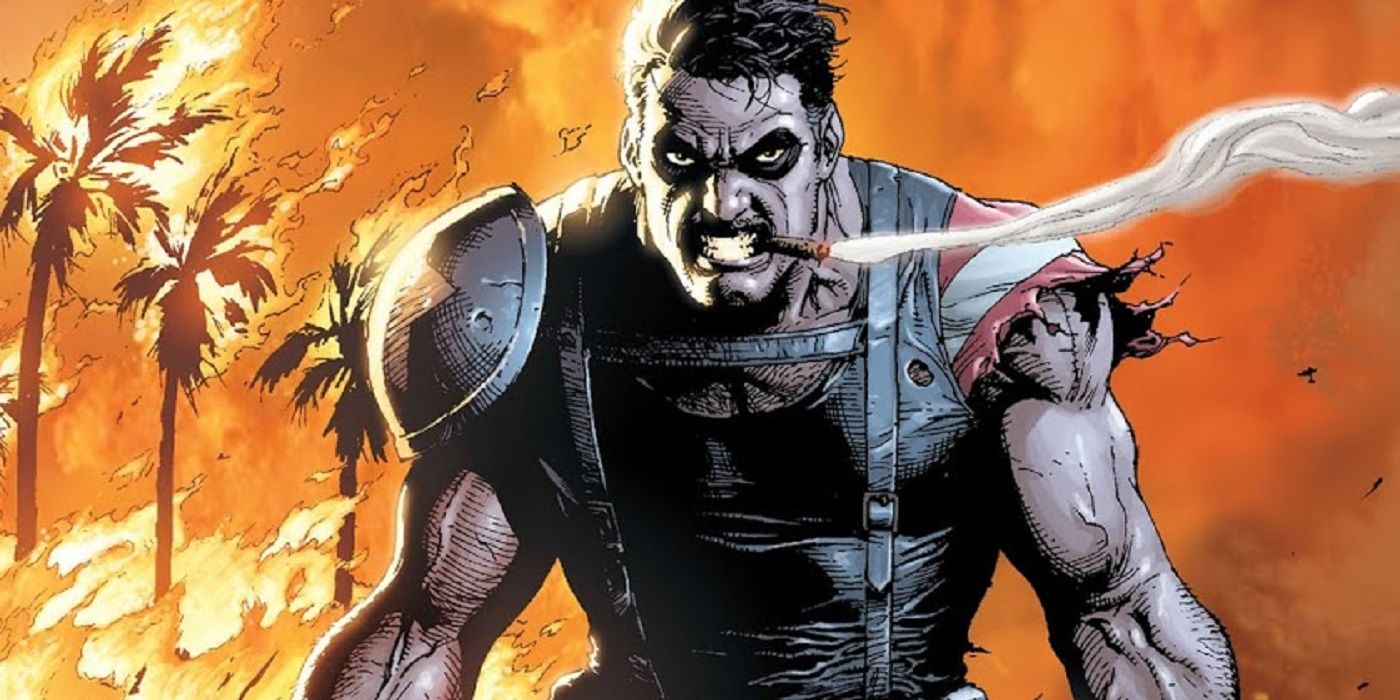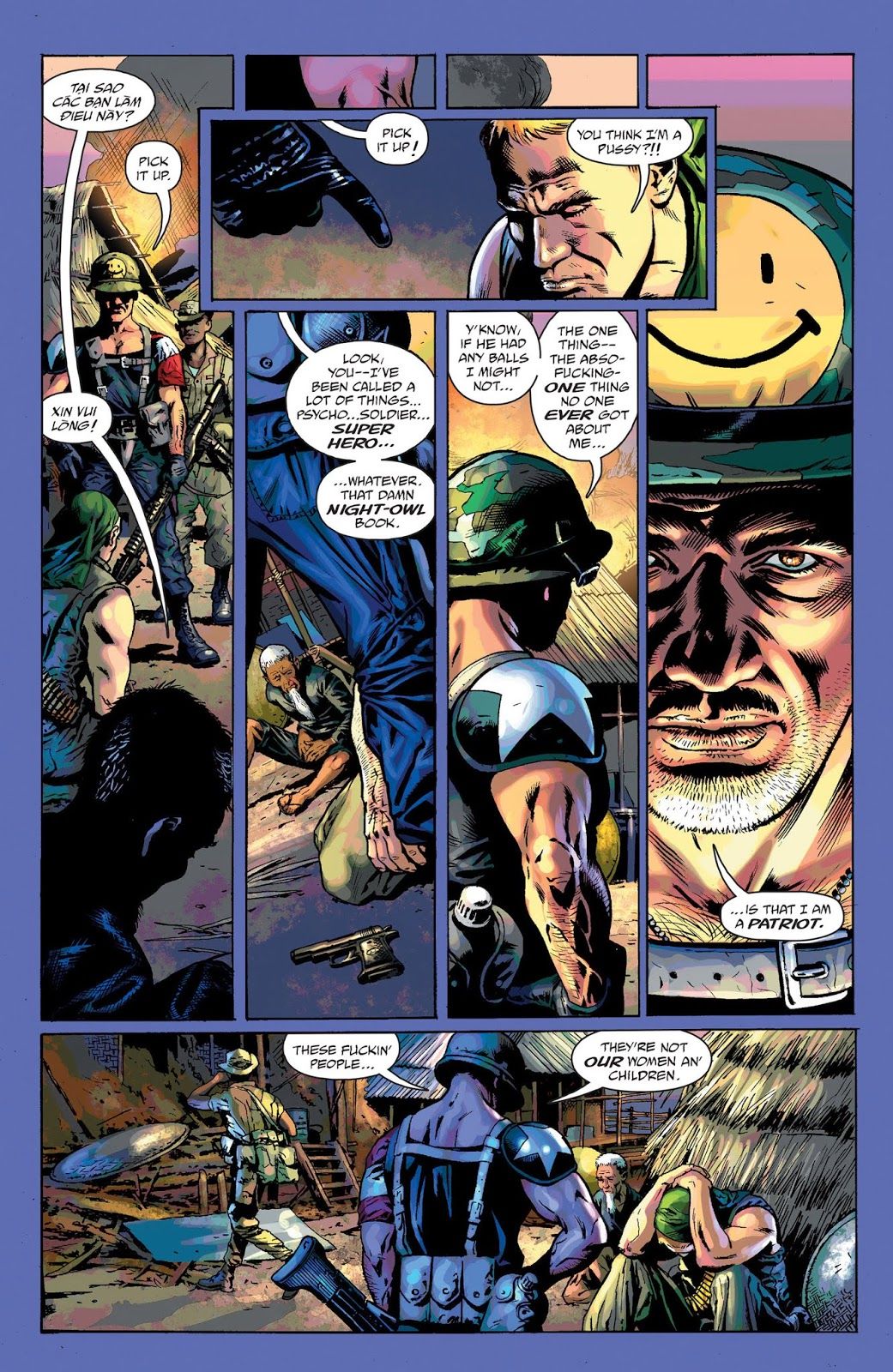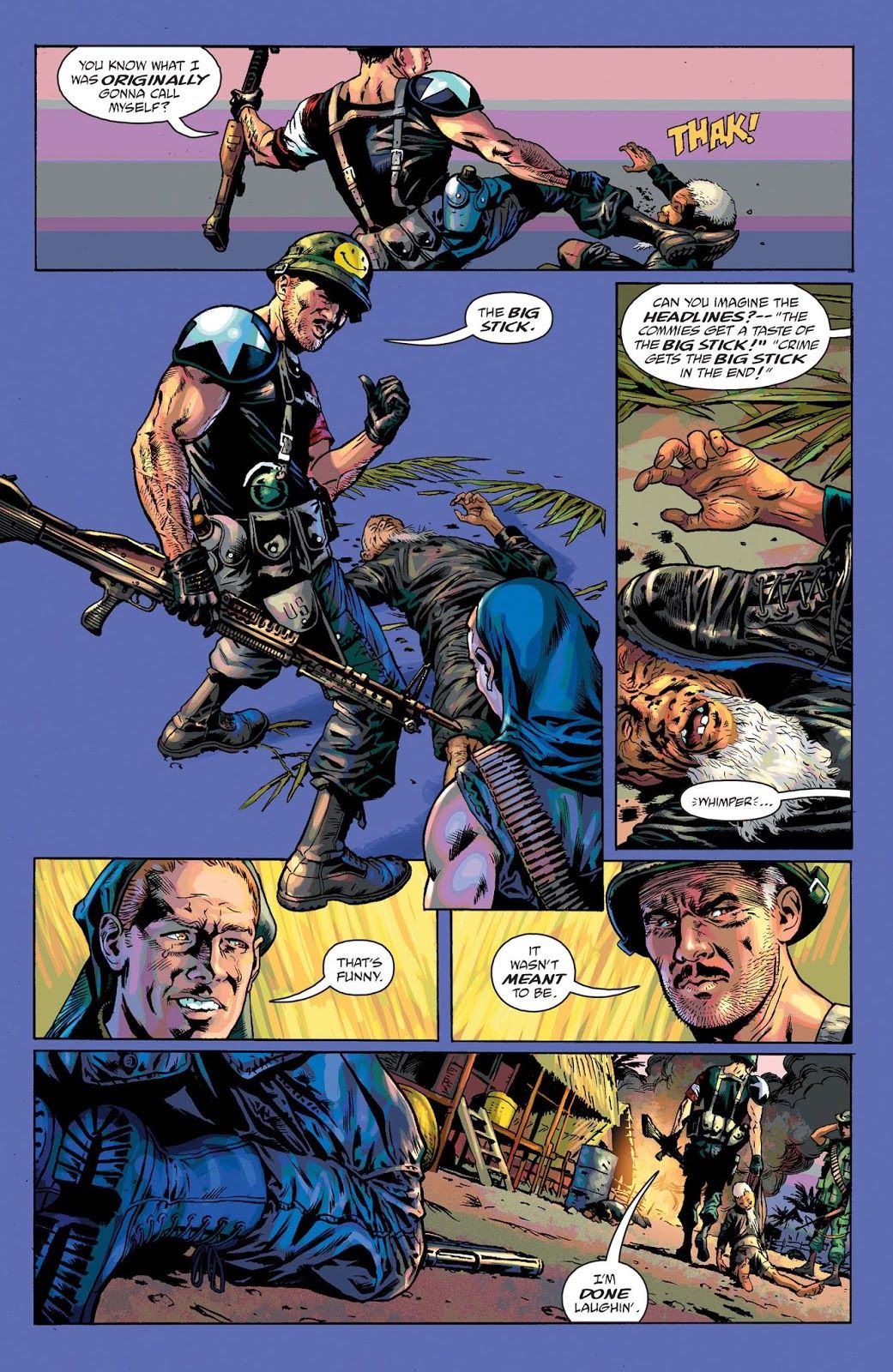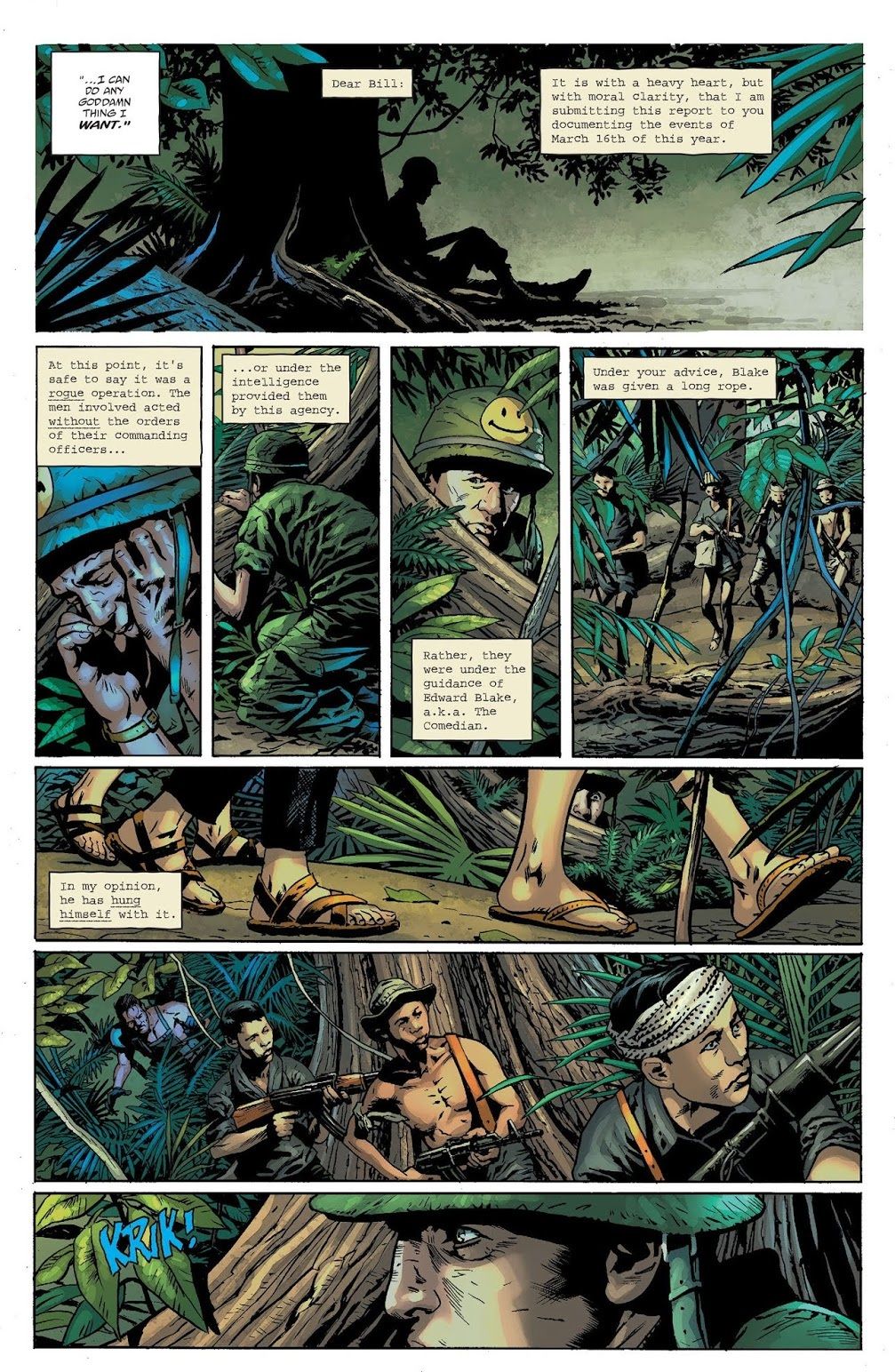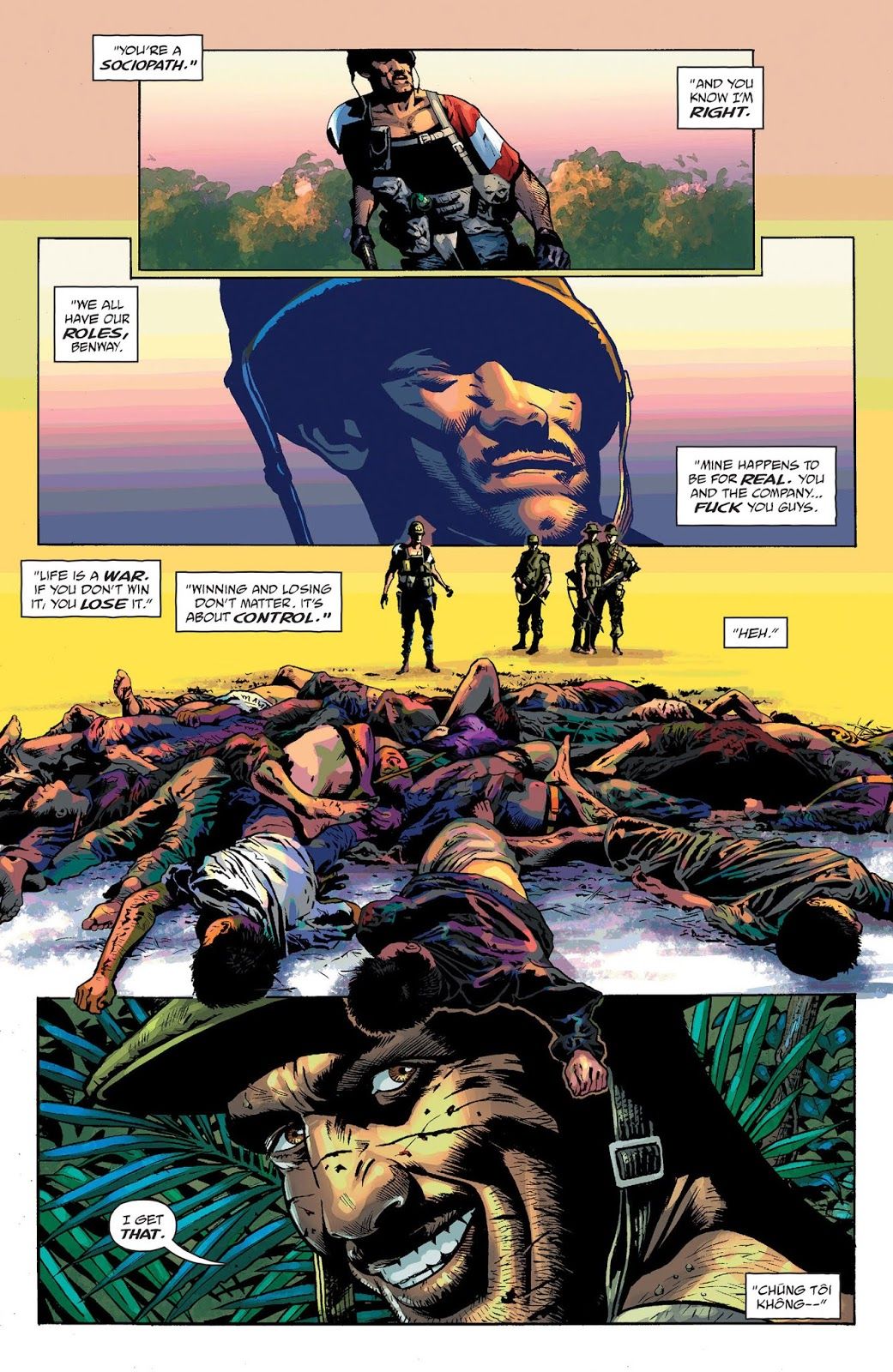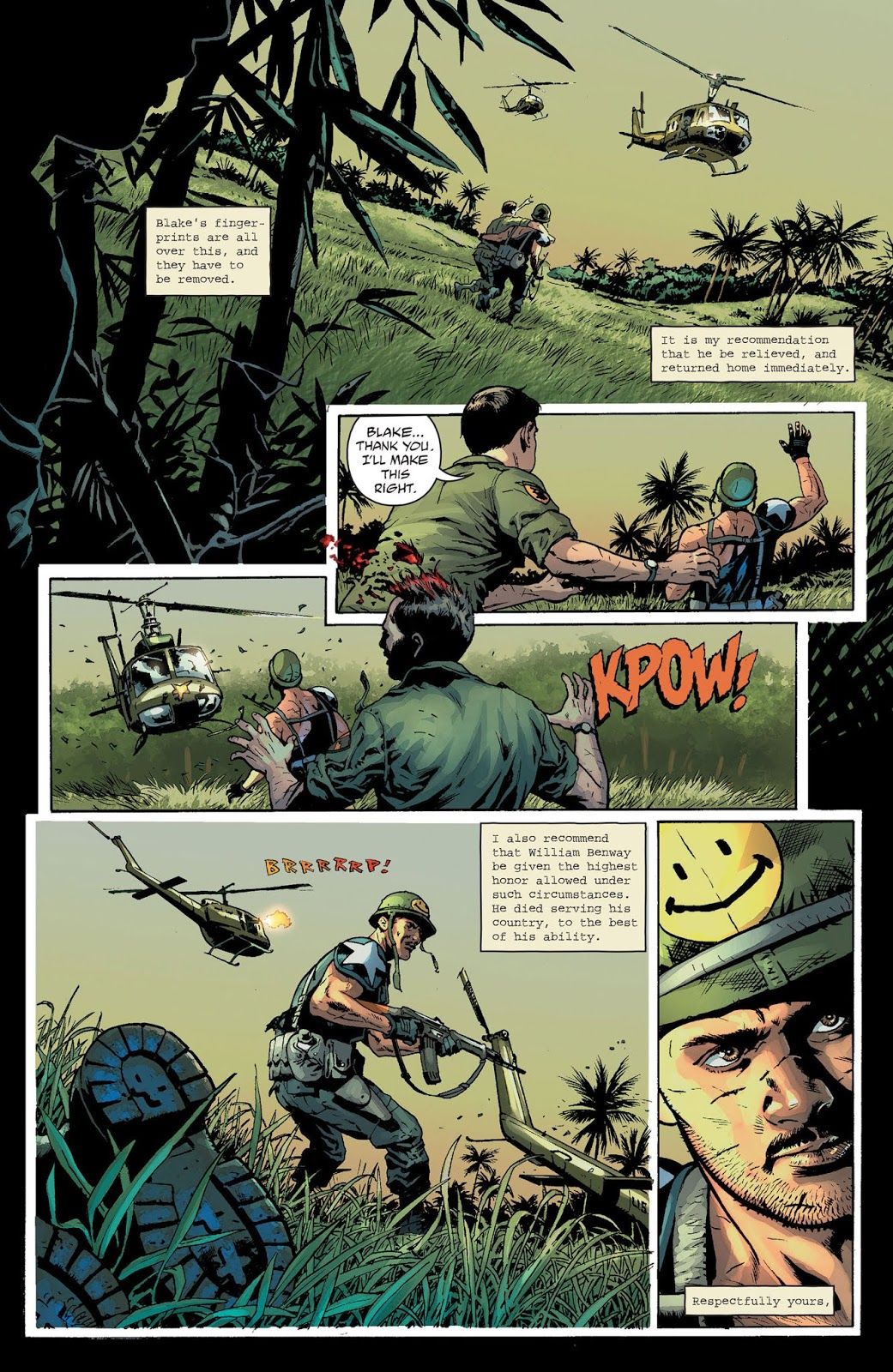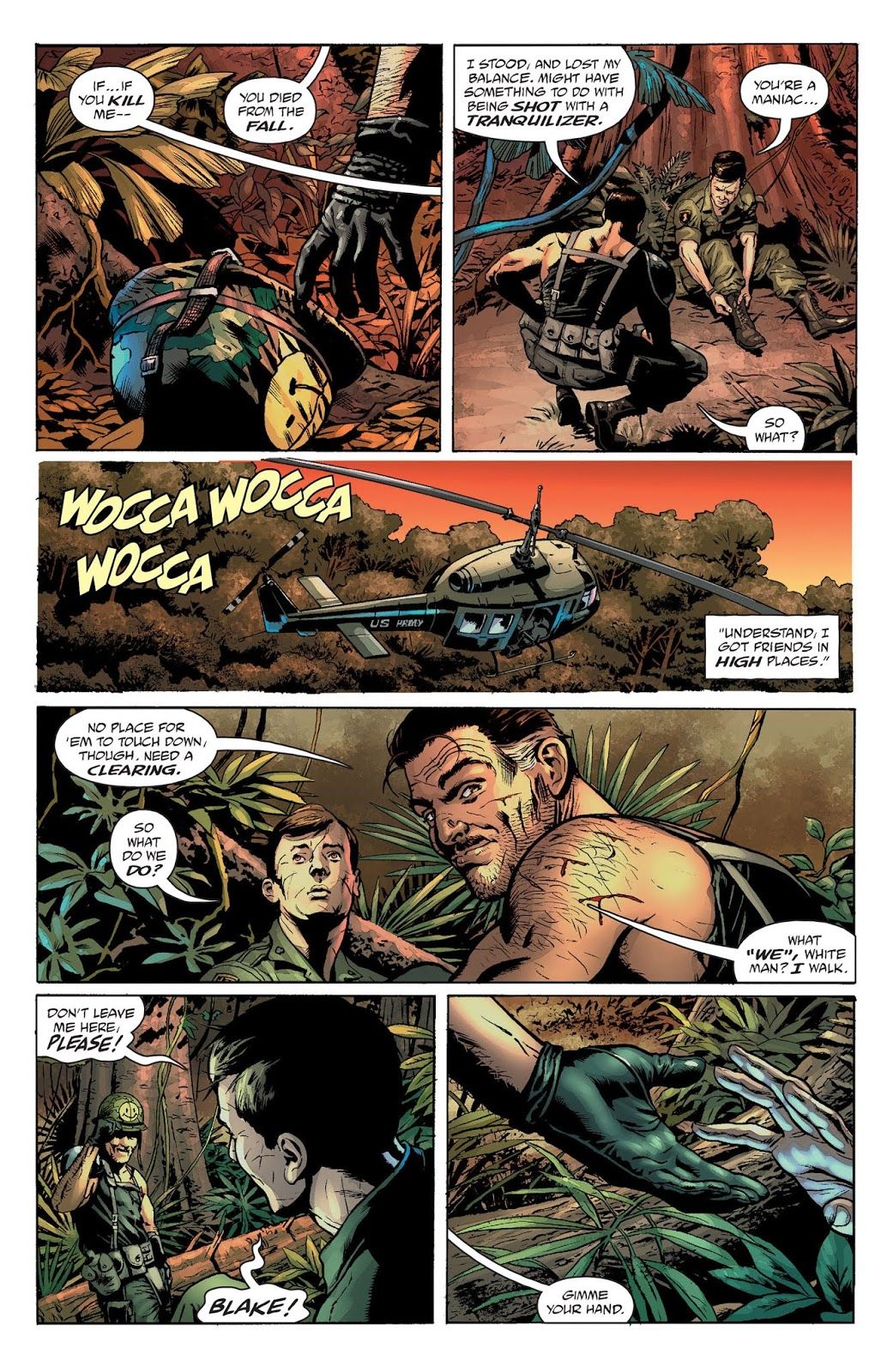Here is the latest installment of ...And the Superhuman Review, where Chad Nevett and Brian Cronin discuss each issue of DC's Before Watchmen event. Just, you know, eight years late. You can check out the earlier reviews here.
We continue with Before Watchmen: Comedian #5, "Kicks," by Brian Azzarello, JG Jones and Alex Sinclair.
Brian Cronin: In this issue, we get to see the fascinating ways that a monster can deem themselves a patriot, as we get our first move towards Edward Blake turning on Robert Kennedy. Do you believe that Blake honestly believes that he is a patriot, or is that just the classic deal of it being the last refuge of a scoundrel?
Chad Nevett: I think he is. I think he subscribes to a very specific vision of America as the biggest and toughest. He advocates some extreme things in an effort to win the war in Vietnam and doesn't care about perception. He cares about results, fuck anything else, and his frustration comes from those who won't do what's necessary to win.
Brian Cronin: So the fascinating thing about the whole issue is that Belway was never really in any danger from Blake this issue, right?
Brian Cronin: At the end of the day, Belway is on "his side."
Brian Cronin: He's "one of his people."
Chad Nevett: Blake doesn't hurt him. He protects Belway until it seems 'safe' when the evac comes and that's when Belway is shot and killed. Blake's problem here is that America doesn't protect its own -- but he does.
Chad Nevett: Of course, his methods are a problem, as the report at the end demonstrates. He's criticized and the dead Belway just gets some 'honors.'
Brian Cronin: We see that with the revelation of what Blake wanted to call himself originally.
Brian Cronin: He wanted to be named The Big Stick.
Brian Cronin: Which shows you how he thinks of the United States and his views on imperialism.
Brian Cronin: If you buy into Roosevelt's views, then that easily explains why Blake would think that there really is nothing wrong with his "treat the other as enemy, no matter what" position.
Chad Nevett: But he's also oddly someone who cares about the people. His idea of America is rooted in the American people and their well being.
Chad Nevett: He fights back against any authority that doesn't put the people first.
Chad Nevett: Attacks the LA police during the riot.
Chad Nevett: Does whatever he can to protect his unit.
Brian Cronin: Yeah, that's that insane bit with him and other soldier, where he honestly thinks he is HELPING the guy by compelling him to start shooting innocent villagers. He does view himself as a man of the people and he was honestly trying to help that guy.
Brian Cronin: Which, of course, leads to the guy killing himself rather than slaughter innocents.
Brian Cronin: We also have Comedian's now standard shot at Doctor Manhattan.
Brian Cronin: When he alludes to him as an example of enemies coming from everywhere, even above.
Brian Cronin: His superhero line, about how superheroes can do whatever they want, I wonder if he is, in a way, being jealous of how Manhattan LITERALLY can do whatever he wants.
Brian Cronin: And the public loves him for it.
Chad Nevett: I assume jealousy. After all, Blake doesn't win the war; Dr. Manhattan does. For all of his talk and action, Blake is still just a regular guy who can't do even a fraction for the people and for America that Manhattan can.
Chad Nevett: If Dr. Manhattan did all of the things Blake did, they would be more in line with what the powers that be want: clean, efficient. Manhattan could eliminate the entire Viet Cong without a single drop of blood. And that's also what Blake hates about him. While he can provide for the people, he does it at the same sort of remove as the government, with the same sort of sporadic whims.
Chad Nevett: Today, it makes sense to not win the war. Tomorrow, it may. Who knows.
Chad Nevett: And Blake hates that.
Brian Cronin: There's that great scene where Blake laughs about the idea that control really is the key, not winning or losing.
Brian Cronin: For those reasons you note, as the plan for American foreign policy might change on a dime.
Brian Cronin: Question - who says "Winning and losing don't matter. It's about control"?
Brian Cronin: In the interaction between Blake and Belway.
Chad Nevett: Belway says it.
Brian Cronin: Thought so.
Brian Cronin: That was oddly profound for Belway, though, right?
Chad Nevett: What I love is that they both believe it, but for different reasons.
Chad Nevett: Belway thinks control comes through perception. That America can control more if people respect it and like it.
Chad Nevett: Blake thinks control comes through force and fear. American can control more if everyone is afraid of what it can do.
Chad Nevett: Belway thinks they need to win the war 'nice' for control; Blake thinks they need to win period.
Chad Nevett: What does it say that, for the latter part of the issue, Blake keeps Belway alive while he cowers behind a tree wearing Blake's helmet?
Brian Cronin: It's what you mentioned earlier, where Blake and Belway have different ideas of what a "sociopath" is in this scenario.
Brian Cronin: Belway believes that Blake, a guy who happily slaughters innocent villagers, is a sociopath.
Brian Cronin: While Blake, meanwhile, views the company, a group that will cut bait on people at any moment, in a similar way.
Brian Cronin: And he shows how he is different because he will make a point to keep Belway safe. As long as Belway has Blake's helmet on, he is safe. The moment Blake takes it back, Belway is killed.
Chad Nevett: While under the protection of the company.
Chad Nevett: You can trust people, you can't trust institutions.
Chad Nevett: Which leads it all back to the Kennedys and his faith in them as people to make the institutions work properly, and his disappointment when they become absorbed into them.
Brian Cronin: It is almost kind of adorable how the issue opens with Blake still talking about his friends in high places.
Brian Cronin: When we've seen that even has to know by now that that is not true.
Brian Cronin: The idea of putting trust into the wrong people ties into a great pop culture reference by Azzarello.
Brian Cronin: When he has Blake quote the famous Mad magazine joke by E. Nelson Bridwell.
Brian Cronin: Where the Lone Ranger and Tonto are surrounded by a bunch of angry Native Americans and Lone Ranger turns to Tonto and says, "What do we do now?" and Tonto says, "What do you mean 'we,' white man?"
Brian Cronin: A hero turned on by someone he trusts, just like Blake feels is happening to him.
Chad Nevett: Not just him.
Chad Nevett: What's funny is that Blake will joke like that, will talk about Belway as being 'the other' in a rhetorical sense, but, when it comes down to it, they're the same and Blake takes care of him anyway.
Chad Nevett: As he says, he's a super-hero.
Brian Cronin: Speaking of the superhero moniker.
Brian Cronin: He references Hollis Mason's book.
Brian Cronin: What is he talking about when he says "if he had any balls I might not"?
Brian Cronin: Obviously, Mason famously threw Blake under the bus in his book.
Brian Cronin: By telling the truth about Blake raping Silk Spectre.
Brian Cronin: But I still can't see what "If he had any balls I might not" could be a reference to.
Chad Nevett: Might not be alive?
Chad Nevett: If he had any balls, he would've killed Blake. Or let Hooded Justice do it.
Chad Nevett: Maybe the 'he' is actually Hooded Justice.
Brian Cronin: That's what I'm confused about, as Hooded Justice was the guy who could have finished him, right?
Brian Cronin: Not Hollis.
Brian Cronin: But yeah, I guess you could be right, he might be thinking of Hooded Justice there.
Brian Cronin: And the mention of Mason's book just took him back to that moment
Brian Cronin: And thinking that Hooded Justice should have just killed him.
Brian Cronin: I don't know if the series has really put enough emphasis on the book, as it only came out FIVE YEARS before the events of this issue.
Chad Nevett: In general, the series doesn't engage with Blake's history with the Minutemen.
Chad Nevett: I wonder why.
Brian Cronin: It's just, for a guy like him, having such a popular book revealing to the world that he raped one of his teammates.
Brian Cronin: That had to have a major impact on not just him, but the way that he is seen by the world, so it's interesting that it isn't really mentioned either way.
Chad Nevett: He doesn't care about perception. Or being liked.
Chad Nevett: Or pretends not to, at least.
Brian Cronin: I continue to be a bit perplexed by the use of J.G. Jones and Alex Sinclair in this series.
Brian Cronin: I think they're doing a fine job, but it just doesn't seem like the sort of thing that would fit Jones' normal style.
Chad Nevett: What would you consider his 'normal style?'
Brian Cronin: More over the top stuff.
Brian Cronin: Like Final Crisis.
Brian Cronin: He's such a good, dynamic artist.
Brian Cronin: And yet this story is more a restrained sort of thing.
Chad Nevett: Well, beyond the cynical "money" answer...
Brian Cronin: I mean, he's certainly fine. He is a good artist, so it doesn't HURT the narrative, but I wonder if he wouldn't have been better suited on one of the other series, like Nite Owl.
Chad Nevett: It could be working with Azzarello. He's a writer whose dialogue is often divorced from what you're looking at. It seems like a situation where an artist would have a lot of freedom to determine specific visuals as he leaves a lot of room for them to carry the book that way.
Chad Nevett: Look at the Blake/Belway conversation told through captions. I wonder how much of the visuals were at Azzarello's direction and how much was Jones just running with what he thought would work...
Brian Cronin: Yeah, that's fair, I would think Azzarello would be a good writer to work with as an artist. It's typically why he's attracted such loyalty with his collaborators.
Brian Cronin: Raul Duke, of course, is a reference to Hunter S. Thompson's Raoul Duke character.
Brian Cronin: But I wonder if it isn't also a reference to Garry Trudeau's Uncle Duke character from Doonesbury.
Brian Cronin: As Uncle Duke was typically shown as connected to the CIA, while I don't know if Thompson's Raoul Duke was.
Chad Nevett: I don't recall anything like that. Duke was the Thompson stand-in in Fear and Loathing in Las Vegas and, then, his alterego at the Sports Desk for Rolling Stone.
Chad Nevett: Yeah, the content of that report is very un-Thompson-like.
Brian Cronin: So it's more likely to be a Doonesbury reference. then.
Brian Cronin: Still a Thompson reference, since Trudeau's Duke is based on Raoul Duke, but just more of a standard "come up with a fun name for a CIA character" bit.
Brian Cronin: I really like the little that we see from Nixon and his guys here, as Nixon is just as cut off from reality as Blake and just as sure as his actions being couched in patriotism.
Brian Cronin: But that, of course, will be the centerpiece of next issue's twisted conclusion of the series.
Chad Nevett: I still don't know what to make of it. Maybe we'll figure it out finally.

